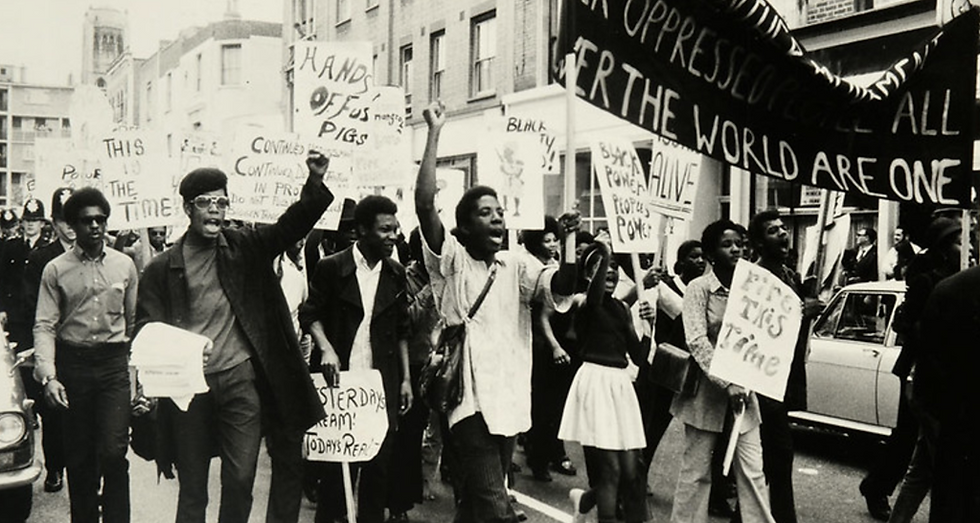Feeling History: How to Integrate Emotion into Understanding Our Past
- Aaron Balick

- Mar 1, 2023
- 4 min read
Updated: Aug 8, 2023

Protests from The Mangrove Nine
How does one going about actively contributing to a cause that is important to them when they don’t have the requisite skills to do so?
This was a conundrum that came up for me while running Stillpoint a psychology hub who’s aim was to apply psychological thinking to contemporary issues. Back in 2019 we wanted to commit to a year of exploring race and racism in contemporary Britain – but none from our team were specialists in this area.
Since we didn’t know how to do it ourselves – we put out a public invitation to ask for help from our community. And this is what happened.
Our public invitation was presented as an open call inviting members of the public to join us for a day of activities to solicit their ideas, creative input, and expertise with the aim of creating a year of events and workshops on this important an challenging theme. Participation was free, and naturally we provided food and snacks throughout the day to keep people energised and well fed.
We were fortunate that the event was attended by a wide variety of people from a variety of backgrounds who were able to contribute from their diverse experiences both personally and professionally. By the time the day ended, we had the beginnings of a programme and a roster of committed individuals who agreed to work with us to make it real.
One of those individuals was Iqbal Singh, Regional Community Partnerships Manager at The National Archives UK, who agreed to partner with us to develop a programme of events exploring Black British History in the United Kingdom through archival records. The idea was to create a space in which members of the public could engage with archival records differently: using them as a not only a way to learn about Britain’s problematic past – but also to psychologically and emotionally integrate that learning into their understanding of themselves.
Read about these events from Iqbal Singh’s perspective.

Abstract collage that went out on our event publicity.
Together, we created something new:
Over several creative sessions we developed a series of events titled Racism Past and Present that would cover three periods of Black British history from the end of the First World War to the 1970s. Our aim was to create a workshop where members of the public could engage with this difficult and painful material beyond simply learning the facts, but also by looking inward into what it means for us as individuals living in Britain today. To this end we developed a workshop model that included exploring archival material with records specialists (educational) followed by writing exercises aimed to integrate our personal and emotional experiences of this experience (emotional and psychological) under the guidance of poetry therapist Charmaine Pollard.
These events went really well and we had wonderful feedback from participants. Iqbal was concurrently running a related set of events in a partnership with the Black, African and Asian Therapy Network (BAATN), and between these partnerships we created a template for an integrated learning methodology that we shared at an event hosted by The British Museum in May of 2021.
Video recording of our interactive online workshop hosted by The British Museum.
Developing a Methodology for Future Work:
In the winter of 2022 Iqbal, in his unrelenting drive to keep a good thing going, reconvened the team to explore a way to capture what we had done so we could develop a methodology, informed by research, that could be replicated and shared more widely across the country. To this end we re-convened and ran a further workshop with a group of volunteer co-researchers who, with their experience and feedback, would help us improve and consolidate the model we created.
We invited Professor Kevin Lu, Head of the Department of Psychosocial and Psychoanalytic Studies at the University of Essex to lead the qualitative research element of this project. With the generous input of all the participants, Professor Lu and myself compiled a report sharing our findings and recommendations which you can read in full here:
Going Forward in this Partnership:
Stillpoint’s mission was to creative innovative ways to apply psychological thinking to the wider world around the issues that are most important to us. We have long recognised that it is only through partnerships with people and organisations outside the world of psychology and mental health. By collaborating with others like The National Archives, we can better integrate psychological methods more widely across society. That is why we are so grateful to pioneering leaders like Iqbal who see the potential of taking psychological thinking into their organisations.
Iqbal has spoken and written eloquently and about his own personal and emotional experiences of engaging with the painful material relating to the partition of British India, a history that relates directly to his family heritage. It was in acknowledging these experiences and being curious about them that led him to pursue the partnership that we currently enjoy, and look forward to developing further in 2023.
Learn more about what motivated Iqbal and take a deeper dive into the development of this fascinating project in Iqbal’s most recent blog post from The National Archives.

Original photo published on the website of The National Archives. Photo credit: Elliot Baxter Photography
Aaron Balick is a psychotherapist, author, consultant, and keynote speaker applying the ideas from psychology in accessible ways people, technology, business, and culture. This article was first published by Stillpoint.






